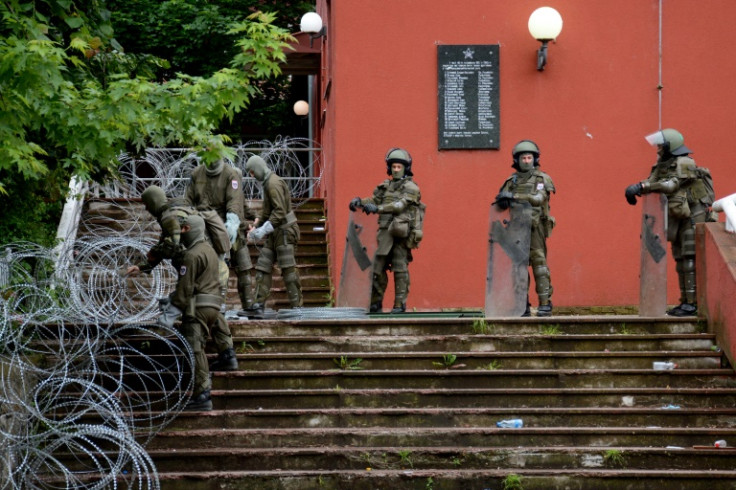NATO-led Peacekeepers Step Up Security After Kosovo Clashes

NATO-led peacekeepers stepped up security around a town hall in northern Kosovo on Wednesday, where hundreds of ethnic Serbs gathered again at the scene of clashes earlier this week that left more than 80 people injured.
NATO has decided to deploy hundreds of reinforcements to strengthen Kosovo's international peacekeeping mission (KFOR) after Monday's violence in the town of Zvecan.
Hundreds of ethnic Serbs rallied outside Zvecan's town hall on Wednesday for a third consecutive day and held aloft a huge Serbian flag that stretched over 200 meters (660 feet) from the municipal building to the town centre.
KFOR soldiers encircled the town hall, additionally securing the building with a metal fence and barbed wire, an AFP journalist said.
Kosovo's ethnic Serb minority boycotted local elections in the north last month, allowing ethnic Albanians to take control of local councils despite a turnout of less than 3.5 percent.
Many Serbs are demanding the withdrawal of Kosovo special police forces, as well as the ethnic Albanian mayors they do not consider their true representatives.
The demonstrators decorated the fence -- erected by KFOR soldiers -- with Serbian flags.
They also carried a flag dedicated to Belgrade-born tennis star Novak Djokovic, who wrote a message on a TV camera at the French Open on Monday calling Kosovo the "heart of Serbia".
Three vehicles of ethnic Albanian Kosovo special police -- whose presence sparks controversy in Serb-majority northern areas -- remained parked outside the town hall.
On Monday, NATO-led peacekeepers used shields and batons in a bid to disperse the crowd but were met by a hail of rocks, bottles and Molotov cocktails.
A total of 30 peacekeepers -- 11 Italians and 19 Hungarians -- were wounded in Monday's clashes, according to KFOR.
Fifty-two protesters were also injured, three of them "seriously", while five Serbs were arrested for taking part in the clashes.
On Tuesday, NATO Secretary General Jens Stoltenberg condemned attacks on the alliance's forces in Kosovo, saying they were "unacceptable and must stop".
"We have decided to deploy 700 more troops from the operational reserve force for Western Balkans and to put an additional battalion of reserve forces on high alertness so that they can also be deployed if needed," Stoltenberg said.
"Violence sets back Kosovo and the entire region."
US Secretary of State Anthony Blinken criticised ally Kosovo, blaming Prime Minister Albin Kurti's government for "sharply and unnecessarily escalated tensions" by installing ethnic Albanian mayors.
The United States also suspended Kosovo from an ongoing military exercise.
Belgrade -- along with its key allies China and Russia -- still does not recognise the move, preventing Pristina from having a seat at the United Nations.
Kosovo is mainly populated by ethnic Albanians, but the Serbs who make up around six percent of the population have remained largely loyal to Belgrade, especially in the north where they are a majority.
© Copyright AFP 2024. All rights reserved.







